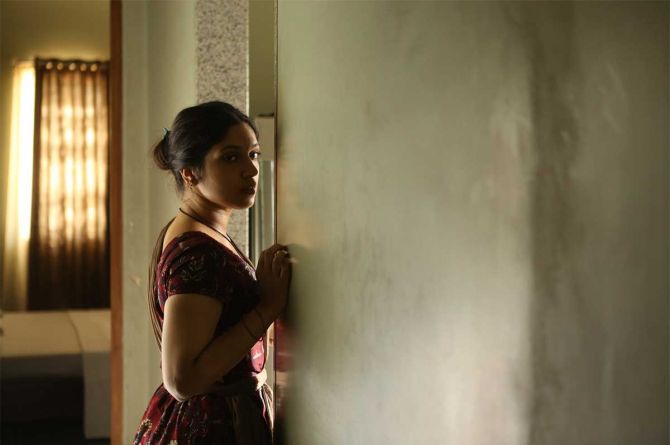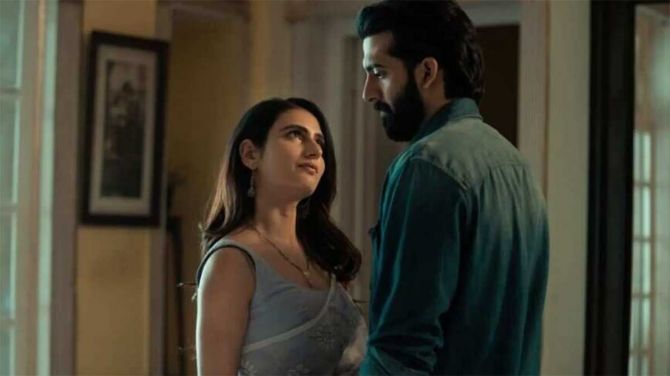I am yet to encounter an anthology of films (made in this country or elsewhere) in which every feature has adhered to a minimum level of quality, asserts Sreehari Nair.

On account of not having a natural fondness for the format, and having been repeatedly stung, I am inclined to avoid anthologies. However, knowing very well that they are a big talking point in our culture, and being anxious for social approval myself, I tend still to leaf through the reviews.
Going over the reviews of the recently out Navarasas (a Netflix anthology of Tamil films), I discovered a pattern which by now is pretty well-set.
For instance, there's no consensus on what the standout film is; there's no consensus on whether there's such a thing as a 'standout film' amid the general ruins.
Almost every feature in that set of nine has been praised by some and derided by the rest.
A Gautham Menon-directed short in the anthology, which has been mocked by one section because it's a showcase for a film-maker who just wouldn't stop coasting on his shore of familiar tropes and jaded infatuations, has been applauded by another section that has read this full-blown exhibition of thought inertia as 'a triumph of personal film-making'.
On the other hand, even the most generous reviewers have had no problems in dismissing the short helmed by Priyadarshan -- who, if his interviews are any indication, takes special pride in making films that you can watch with your entire family -- as puerile and tasteless.
If these diagnoses in themselves don't break your heart, hold the line for certain journalistic clichés, which now seem patented by this particular format: 'Hits and Misses'; 'Erratic'; 'Erratic Mixed Bag'.

In composing the reviews of such anthologies, one gets the feeling that the critic is downsizing her own ability to think, to reason, to articulate. This is the real face (the morbid face, if you will) of Indian film criticism that has to wait impatiently for the annual Salman Khan mediocrity to parade its glorious wit to the world. And so, from the many grottoes of social media, the groan continues to be heard: 'Why are our anthologies so bad?'
But here's the sad part, you see. As much as from the critics and the viewers at large, I can hear a groan of frustration, equally intense, issuing from the film-makers themselves. For a film-maker who has been persuaded into becoming a part of an anthology is in essence that unfortunate creature whose wings have been clipped, whose boundaries have been pre-defined in some measure, whose imagination has in some ways been restricted.
Yes, anthologies of films bound by a common theme, or films circumscribed by a particular subject-matter, are 'anti-imagination' because they go against a basic yet largely unstated creative truth: as a film-maker you don't choose a subject, it chooses you.
Regardless of whether its driving idea is yours, or that of an independent writer, a film essentially comes to you as a throb, a pang, to which you then attach the high-wire job of making it.
If this is indeed the process, then the act of choosing the subject for a film -- that is to say a good film; we are assuming quality here -- is never a moral act of choice, but a subconscious act of recognition.
A film-maker 'recognises' a subject. And this recognition of what to make next is strongly linked to a film-maker's temperament (which critics can then go ahead and devolve into a fashionable theory about the film-maker's tics and signatures).
It's because an anthology messes around with these organic steps of film-making, it's because not every film-maker would have his temperament suited to a theme (regardless of whether this theme is Deviant Love or Satyajit Ray's Humane Vision) that the format is predisposed to give us, at best, one good feature that sticks out among an endless procession of duds.
This is also why the standout film in an anthology (such as Dibakar Banerjee's short in Lust Stories; or Neeraj Ghaywan's short in Ajeeb Dastans -- which I haven't watched, but have been told is very good) is often an extension of a filmmaker's honest obsession, a film-maker's continuing search, than an attempt to be sincere to a theme.

So the question is: What do we do about our anthologies; how do we rescue them from banality? And it's here that we may turn for inspiration to a sister form: the short story collection.
I am yet to encounter an anthology of films (made in this country or elsewhere) in which every feature has adhered to a minimum level of quality. And yet, haven't we all read innumerable collections of short stories -- with one author at the centre, or a group of authors -- where every story has gone on to achieve its specific destiny?
I suppose the difference in approaches is what makes all the difference.
In a good collection of short stories, it's the stories themselves that come first. The decision to bind them up, to group them under one title, is the final step, and hardly an artistic decision.
We ought to ask then: Can the process of putting together an anthology of films be modeled on how a good short story collection is put together?
Can we let four or five ambitious, visionary directors of ours free, allow them to go out into the world unbriefed, allow them to make whatever short film they wish to, on whichever subject, and then ask the marketers at the studio to come up with a theme that would connect these films?
I know this change in approach may sound economically kooky, but unless a marketer's cunning is dissociated from a film-maker's temperament, there's no way our anthologies would get any less disappointing.
Chekhov did not write his story of Dmitri Gurov and the Pomeranian-wielding Anna Sergeyevna under a publisher's diktat to bulk up the theme of 'lovers finding each other away from home.' And it took a smart publisher to perceive that the slightly displaced, slightly delusional men and women in Chekhov's stories could have a global market.
The way to fix our anthologies is to redo the very method of their conception. As of now, the marketers are running the show; we have to ensure that the artists get hold of the whip.

Feature Presentation: Ashish Narsale/Rediff.com










